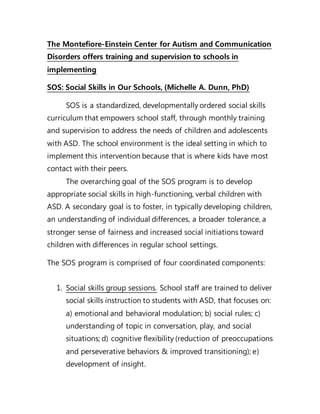Recommended
This workshop will explore the barriers and opportunities within our schools and in our communities to building relationships and partnerships with our families. It is essential to engage family members in culturally responsive ways as partners in the healing process but the traditional methods of reaching families are not effective, especially for students and families experiencing trauma. Participants will hear personal stories, reflect on how our beliefs and practices impact families, and learn concrete strategies to engage and empower families.
Leveraging the Power of Relationships to Engage and Empower Families

Leveraging the Power of Relationships to Engage and Empower FamiliesCalifornia School-Based Health Alliance
More Related Content
What's hot
This workshop will explore the barriers and opportunities within our schools and in our communities to building relationships and partnerships with our families. It is essential to engage family members in culturally responsive ways as partners in the healing process but the traditional methods of reaching families are not effective, especially for students and families experiencing trauma. Participants will hear personal stories, reflect on how our beliefs and practices impact families, and learn concrete strategies to engage and empower families.
Leveraging the Power of Relationships to Engage and Empower Families

Leveraging the Power of Relationships to Engage and Empower FamiliesCalifornia School-Based Health Alliance
What's hot (7)
Leveraging the Power of Relationships to Engage and Empower Families

Leveraging the Power of Relationships to Engage and Empower Families
Similar to SOS
Similar to SOS (20)
Holistic Growth Private Elementary Education and Its Multifaceted Benefits.pdf

Holistic Growth Private Elementary Education and Its Multifaceted Benefits.pdf
International Journal of Humanities and Social Science Invention (IJHSSI)

International Journal of Humanities and Social Science Invention (IJHSSI)
Educational Psychology. By Theresa Lowry-Lehnen. Lecturer of Psychology

Educational Psychology. By Theresa Lowry-Lehnen. Lecturer of Psychology
104 Reprinted fromYoung Children • January 2010® 1, 2,.docx

104 Reprinted fromYoung Children • January 2010® 1, 2,.docx
Why is Pre-Nursery School Important for Children.docx

Why is Pre-Nursery School Important for Children.docx
Holistic Assessment in Early Learning Centre: Nurturing Growth and Development

Holistic Assessment in Early Learning Centre: Nurturing Growth and Development
Tailoring School-based Interventions for Students with Autism: Essential Tips

Tailoring School-based Interventions for Students with Autism: Essential Tips
SOS
- 1. The Montefiore-Einstein Center for Autism and Communication Disorders offers training and supervision to schools in implementing SOS: Social Skills in Our Schools, (Michelle A. Dunn, PhD) SOS is a standardized, developmentally ordered social skills curriculum that empowers school staff, through monthly training and supervision to address the needs of children and adolescents with ASD. The school environment is the ideal setting in which to implement this intervention because that is where kids have most contact with their peers. The overarching goal of the SOS program is to develop appropriate social skills in high-functioning, verbal children with ASD. A secondary goal is to foster, in typically developing children, an understanding of individual differences, a broader tolerance, a stronger sense of fairness and increased social initiations toward children with differences in regular school settings. The SOS program is comprised of four coordinated components: 1. Social skills group sessions. School staff are trained to deliver social skills instruction to students with ASD, that focuses on: a) emotional and behavioral modulation; b) social rules; c) understanding of topic in conversation, play, and social situations; d) cognitive flexibility (reduction of preoccupations and perseverative behaviors & improved transitioning); e) development of insight.
- 2. 2. Social skills lessons in the mainstream classroom. Teachers are trained in the delivery of character education lessons that teach typically developing peers to support the integration of students with ASD into larger social settings. This reinforces performance and fluency of social skills. 3. Peer mentoring. Teachers learn to train same-age mentors to support conversation and play in unstructured school environments, such as during lunch and recess. 4. Parental involvement. Parents are taught to reinforce the new skills or “rules” with homework outlined in the curriculum manual.
